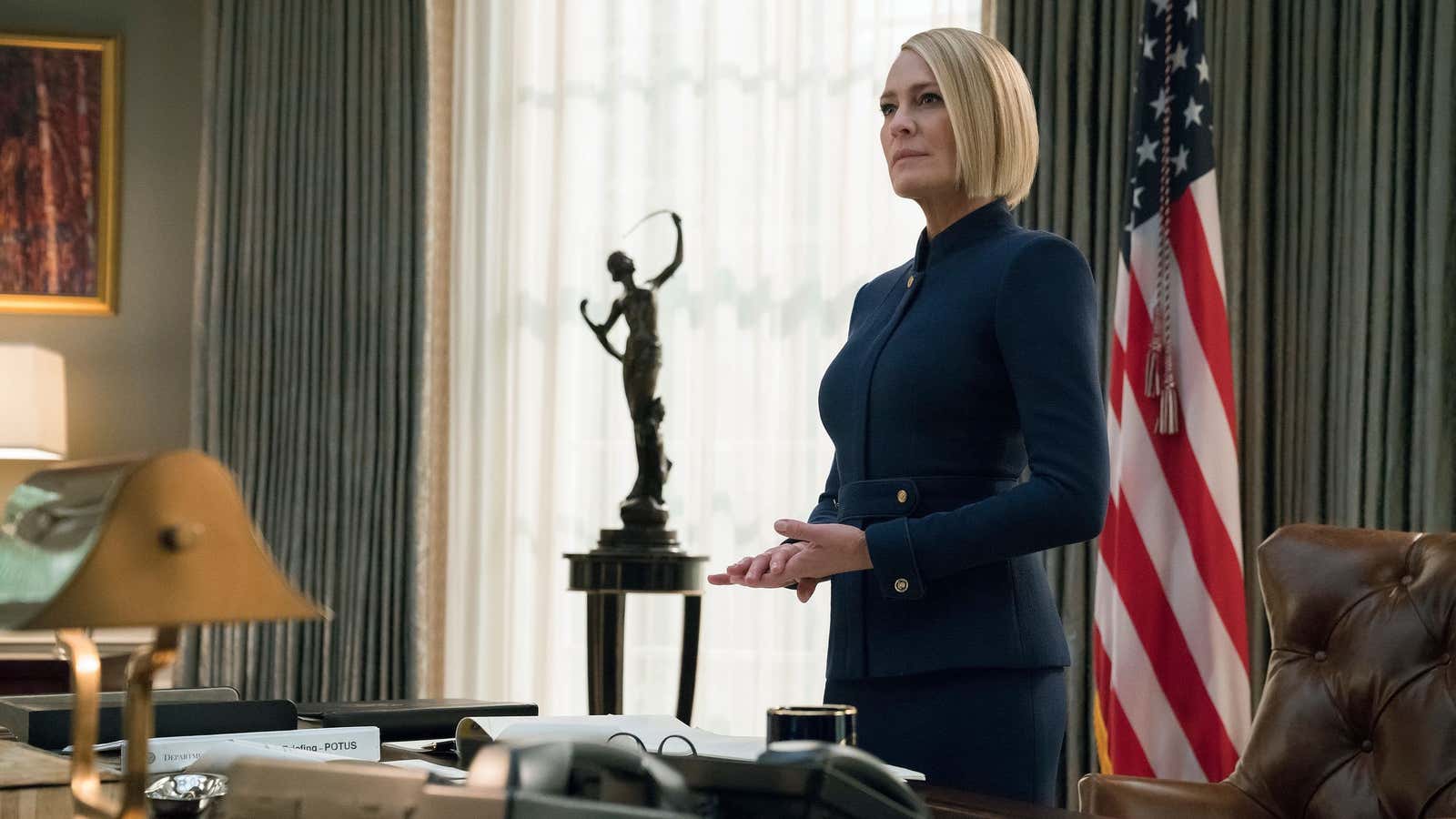Scroll through the Netflix app and you’re likely to find the streaming giant’s logo blaring back at you from many titles in its library. The Umbrella Academy, a Netflix original. The Punisher, a Netflix original. The Great British Baking Show, a Netflix original. It’s not always clear what “original” means.
Many of the original series that put Netflix on the map, like House of Cards, Orange Is the New Black, and Narcos, weren’t made by Netflix. The Silicon Valley-born tech giant gets a lot of its original series from the same studios that make shows for traditional TV networks, like Warner Bros. TV, Sony Pictures TV, Paramount TV, and Lionsgate.
House of Cards, the first series that Netflix commissioned in 2013, was licensed from the studio Media Rights Capital. In China, where Netflix isn’t available, the show streams with ads via the online-video service Sohu (paywall). Orange Is the New Black came from Lionsgate. And, more recently, the series You aired on the US TV channel Lifetime and streamed on Netflix as an original internationally.
Netflix uses the term “original” to delineate between movies and series that are exclusive to its platform, and those that are aggregated from other studios after first being made available elsewhere. Original can refer to a few things: content such as Stranger Things that are self produced, programming like Narcos that are licensed exclusively from other studios and branded as Netflix originals, or licensed content such as You and Riverdale that may air on TV in some markets but stream first on Netflix in other parts of the world.
Must-watch content that can’t be found anywhere else has become a big selling point for Netflix as it fends off competition from Amazon, Hulu, Disney, and the like. About 85% of all new spending on content goes toward original programming, Netflix said last year.
The streaming giant has faced pressure from investors and customers who worry that media companies like Disney and WarnerMedia will pull popular aggregated content from Netflix when they launch their own services. Disney already chose not to renew its deal to stream new movies on Netflix. And WarnerMedia has suggested it won’t license its classic TV series Friends exclusively to Netflix beyond 2019 (paywall). But it’s not just Netflix’s aggregated content that may be under threat, given that some of the studios that produce its biggest original series are owned by the same companies.
Among the risks Netflix added to its annual financial filing (pdf) with the Securities and Exchange Commission was an acknowledgement that some of its competitors have “exclusive rights to certain content,” and that ”as content providers develop their own streaming services, they may be unwilling to provide us with access to certain content, including popular series or movies.”
The company is lessening its reliance on content from other studios to hedge against those studios jacking up prices or withholding the content altogether. In the past few months, it canceled all of its five original series from Disney’s Marvel Television, for example.
Netflix is now focusing more on the originals it self produces, such as Stranger Things, the Queer Eye revival, The Santa Clarita Diet, Nailed It! and 3%. “These are all shows that people really love in enormous numbers around the world,” said Ted Sarandos, chief content officer at Netflix, said in October. “And we don’t have to go through the gun-to-your-head renegotiation every couple of years for them.” The company has not revealed the share of its originals that are self produced.
That’s not to say licensed originals aren’t successful on Netflix. The streaming-video company estimated that 40 million member households (pdf) watched You in its first four weeks on the platform. Netflix had 140 million paying members around that time. The show, which was picked up by Netflix for a second season that will be exclusive to the platform globally, became popular thanks in part to its Netflix branding, Digiday’s Video Briefing newsletter pointed out.
Some traditional TV studios still like making shows for Netflix. Viacom launched studios for TV brands like MTV and Nickelodeon to produce series for other streaming platforms including Netflix. Netflix licensed the series Avatar: The Last Airbender from Nickelodeon’s studio, and Awesomeness, another division of Viacom, delivered Netflix’s hit original movie To All The Boys I’ve Loved Before.
Self producing usually requires more investment up front, and can be riskier than licensing from another studio. As the old Hollywood adage goes, “nobody knows anything.” But it can also be cheaper in the long run as it doesn’t require Netflix to renegotiate deals with third-party studios every few years.
When Netflix produces its own originals, it also has more control over them. It owns the rights to the content globally, as well as the intellectual property, which Netflix can license for toys and other merchandising, or even theme-park attractions.
That’s partly why the company paid an extravagant $300 million to lock hitmaker Ryan Murphy, who created Glee, American Crime Story, and American Horror Story, into an five-year deal to create shows for the platform; signed Shonda Rhimes, the mastermind behind Grey’s Anatomy and Scandal, to build her own mini-Marvel inside the company; and bought comic-book publisher Millarworld in 2017. Netflix, which spent $12 billion on content in 2018, also bought a $30 million, 28-acre production center in New Mexico last year to scale up its output.
